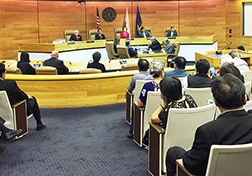
CERRITOS, CA – Remember the evening of November 8, 2016, when irrespective of whether one voted or not for Donald J Trump, the nation collectively let out a stunned gasp when the votes for president were counted? On April 26, 2017, Indian-American visitors and citizens of Cerritos had a relapse, feeling their jaws slacken...

Before trying to understand the political machinations that led to this result, it should be noted that the position of Mayor is largely ceremonial. Solanki will remain a member of the city council for another two years.
CITY ELECTIONS
As the evening began, every seat in the city council chamber was taken; observers stood at the back and along the walls filling it to capacity. This was the first meeting after the April 11 city elections, held to fill two slots in the five member council. The 71-year-old Grace Hu, won her seat handily with 3,375 votes. Hu has a long electoral history; she first won her seat on the city Council in 1992, went on to run a losing State Assembly campaign in 2006, and then returned to contest for City Council in two failed election cycles. Frank Yokoyama won a close race, with just 33 votes separating him from the Solanki-backed Chuong Vo.
AUDIENCE
The two winners came with their families for the swearing-in, as did the outgoing Mayor George Ray and Councilmember Carol Chen. Then there was Solanki; by one estimate his family alone numbered in the dozens. Add to this a preponderance of members from the Gujarati community and several other Indian-Americans. While there were some whispers that his election to the Mayor’s office was not a lock, most were unaware and the mood was upbeat as everyone settled in for the proceedings.
STUNNED
After honoring the outgoing members and the swearing-in of Hu and Yokoyama, the city clerk opened the floor for the nomination of the vacant Mayoral chair. Yokoyama and sitting member Mark Pulido quickly nominated Hu. Jim Edwards, also a sitting member, nominated Solanki. In the voice vote that followed, Hu voting for herself stated coyly, she could not turn down such an opportunity. The same fault lines played out 3-2 in electing the Mayor pro tem. Pulido won over Edwards.
Astounded low murmurs ran through the hall. Frustrated Solanki supporters began walking out. Edwards declared that it was a “sad day,” and he was “very disappointed” in what had transpired, with history and tradition trampled upon. He opined, “Solanki has not been given his fair opportunity.”
Outside, emotions ran high with some tears and head shaking. Deepak Jhaveri, appointed to the city’s Planning Commission by Solanki, was categorical about how he felt, terming the situation a “drama” and calling it “deplorable”. He later said, “the venom of revenge and self-interest seemed to taken the front seat and the ‘Honor of the City’ was strangled in front of the overflowing crowds.”
BETRAYED
Solanki, speaking to India Journal a few days later, professed he was blindsided by the 3-2 vote that went against him. He laid the blame of his loss at the doorstep of Hu, who he said had told him that he could “absolutely” count on her support. “She lied to me,” he said narrating how he had gone to Hu’s office to meet her days prior to the mayoral vote and how she had said she would vote for him.
“She turned around 360 degrees. If she had changed her mind, she could have told me,” he said in quiet but forceful tones, “instead of causing me humiliation and embarrassment.” He summed up the entire fiasco saying he felt, “betrayed.”
But of course this is the shifting sands of politics.
POLITICS
Just a few short years ago, Hu and Pulido would have seemed like strange political partners. The huge fracas over the naming of the Whitney High School Multimedia Center after Hu, for which she donated $750,000, was challenged by Pulido. But political memory can be short.
Political memory can also be long. Chen and Ray, the outgoing members had stymied the appointment of Yokoyama by Pulido to the planning commission. This was in 2011. By 2017 it was payback time.
COMMUNITY
Apart from being caught in the wheels of the politicking, Solanki, not the model PR person in the best of times, endorsed in the elections Bruce Barrows, a former Mayor, over the two Indian-American candidates in the running. New comer Anantha Ramachandran who pulled a reasonable 1,088 votes and a young Ashish Verma contested on their own steam. The buzz on the ground is that it might have cost Solanki and in a roundabout played into the hands of political opponents. His not endorsing Anantha or Verma could have split the Indian-American vote and caused the candidates he supported to lose votes from the community.
While agreeing that the votes could have been divided, Solanki said, “I know I should support my community but I also represent the entire [city].” He rushes to say that he really has no problem backing an Indian-American candidate with knowledge and experience.
FUTURE
Solanki says his father’s urging to keep going has him ready to do just that and to work for the city irrespective of how tradition was ignored and politics played out.

 RSS Feed
RSS Feed
